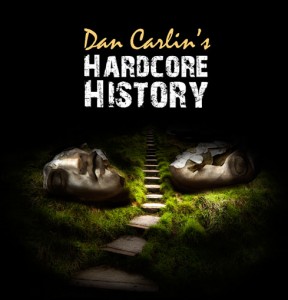I feel bad for not having posted anything about Dan Carlin earlier. I’ve been listening to his podcasts for months now. Common Sense is political commentary with an edge, keeping it very real but no less engaging and insightful, whereas Hardcore History is historical commentary and narration with an even sharper edge! He is a wise person and I enjoy his shows very much, they’re excellent food for thought and for my side whole which loves anything that gives alternative meanings and explanations to stuff we think we know. It is always a great reminder for how little there is that we know compared to what’s out out there and how distorted, biased and altered that little we know really is. It’s a reality (ironic, isn’t it) wake-up call I quite often find myself in need of. Same reason I love You Are Not So Smart. 🙂
Common Sense has plenty of episodes and is more pic’n’mix-y. Go in there, download what might look interesting to you, pop that little sumbitch in your MP3 player and enjoy — preferably going on a long walk! That’s exactly what I’m going to do tonight with the first episode after the US elections.
Hardcore History I feel is more suitable for me to suggest some episodes from:
Logical Insanity — Was dropping the atomic bombs on Japan such a despicable act, considering what else had gone on during the war as far as attrocities go? A history of strategic bombing in the first part of the 20th century.
Globalization Unto Death — The story of Magellan’s voyage and some insights I bet you’ve never heard of (at least I never had). Such as: who was really the first person to circumnavigate the globe? How did people first meeting indigenous South Americans react to them? What inspired people to become sailors in the 16th century, knowing full well that most of the exploration caravels never came back?
Ghosts of the Ostfront — A haunting journey to the oft-forgotten Eastern Front of World War II, by itself the largest military conflict of all time.
Suffer the Children — Is it possible that history as we know it is a result of all the children having been mistreated in times past, therefore, according to contemporary psychology, growing up to in turn mistreat others as a result? Listen to this if you feel you need some hope for the future.
I know that the two above episodes can’t be accessed unless you buy them. Well, if you’re reading this and would like to listen to them, I’d be glad to share them with you. You can tell how much I like this guy by the fact that I’ve bought plenty of his past work already. Dan, if you ever read this, I hope the fact might spare me from your wrath. 🙂

